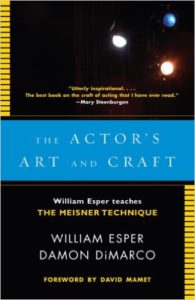 I read this book because I thought it might help me create better characters in my novels. As an author, I struggle to create characters who don’t sound and act just like me. I’ve often chosen females as my first-person narrator just to force me out of my own head. I’ve tried black people, immigrants, aliens (I mean space-aliens) for the same reason. It’s a struggle because I’m me and not anybody else. How do actors do it? They can be anybody.
I read this book because I thought it might help me create better characters in my novels. As an author, I struggle to create characters who don’t sound and act just like me. I’ve often chosen females as my first-person narrator just to force me out of my own head. I’ve tried black people, immigrants, aliens (I mean space-aliens) for the same reason. It’s a struggle because I’m me and not anybody else. How do actors do it? They can be anybody.
I did learn some interesting lessons about acting from this book. Actors simply gush over it, judging from reviews. I’m mystified by that.
Esper co-taught with legendary acting coach Sanford Meisner for nearly two decades and apparently wears the mantle now. I’m no actor so I cannot fairly describe what the “Meisner method” is, but this book purports to transmit at least the flavor of it.
The chapters and scenes describe a series of workshops conducted by Esper with a group of eight actors with various levels of experience. Esper gives instructions on how to execute a certain scenario, such as walking into a room, interrupting someone, then each student tries it, followed by extensive feedback discussion.
I’d say the main lesson conveyed is to be a good listener, which means don’t worry about your lines and how you’re going to deliver them but be open and receptive to the other actor(s) and let yourself react “naturally” to that person and the situation. Of course you will react with your memorized lines, not your own speech, but beyond that, your “acting” must be your genuine reactions. In other words, be extremely open to experience.
Some people are naturally open to experience (their own and others’) and some are not. It’s supposedly a fixed, or inborn personality trait, measured on the “Big Five” inventory (many versions online). Some people live with openness to experience and some don’t. If you are not accustomed to feeling the presence of the other and to being open to your own feelings, then this book might be a revelation. Otherwise it might seem like a compilation of incredibly mundane observations masquerading as pseudo-wisdom.
It’s certainly not well-written. The co-author, DiMarco, is an MFA actor, although he has written other books, but his attempts to introduce drama into scenes that have none are cringeworthy, as are his attempts at elevated description. On the other hand, it seems like he did understand and convey the Esper acting lessons, which was the main task.
Did I get what I wanted, insight on how to write better characters? Yes and no. I didn’t learn anything new, but my attention was shifted to the idea of openness. I decided I could improve my characters by being more open to their presence (which presence I have to create first, of course – no small feat). I think that will improve my work.
As for dialog between characters, I decided that I am pretty good at having characters be open to each other, so that was satisfying. So I didn’t pick up any new writing technique but I did shift my attention a little in a way that I think will be helpful.
I still don’t understand the acting magic, which I appreciate, but don’t see revealed in this book. This openness technique would be very practical for improv, it seems, but for a scripted, directed part – I don’t really see how it would help much. But I’m not an actor, so…
Esper, William, & DiMarco, Damon (2008). The Actor’s Art and Craft: William Esper teaches the Meisner Technique. New York: Random/Anchor (286 pp).
